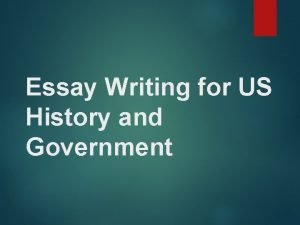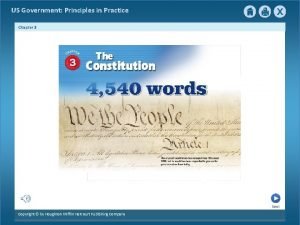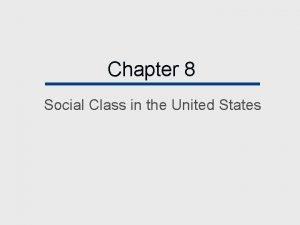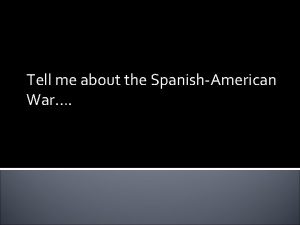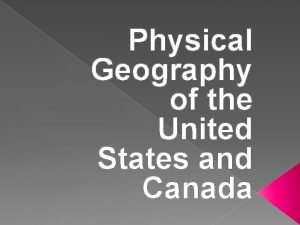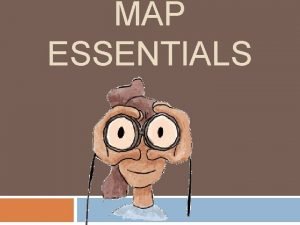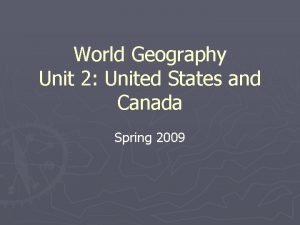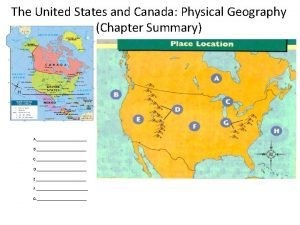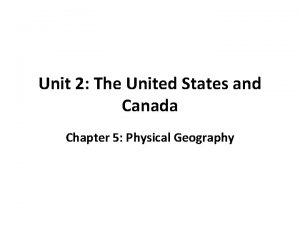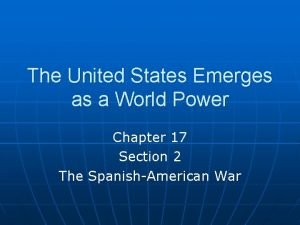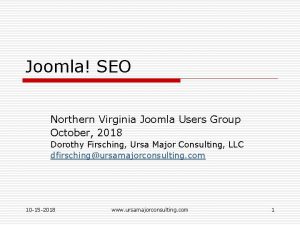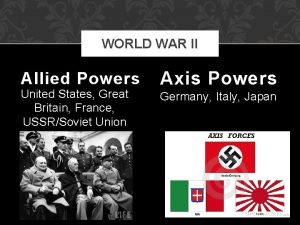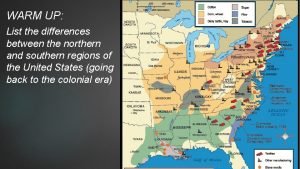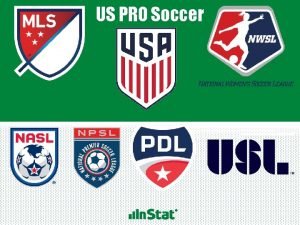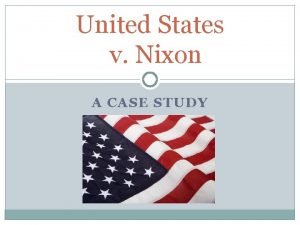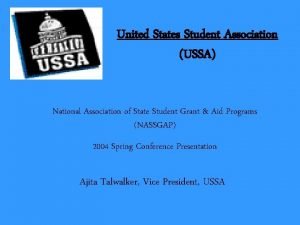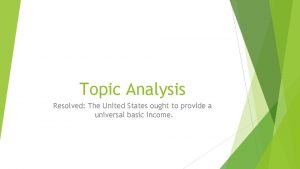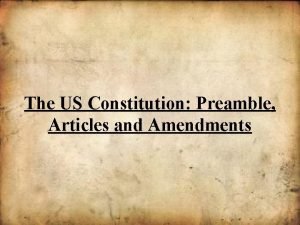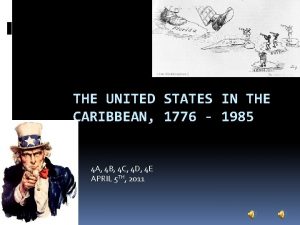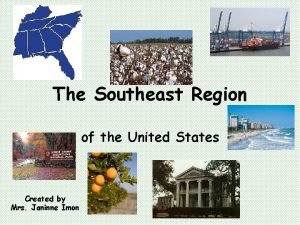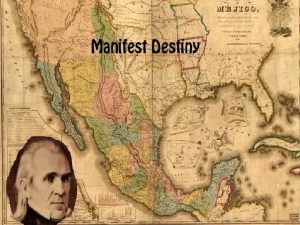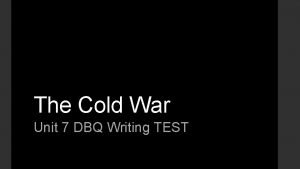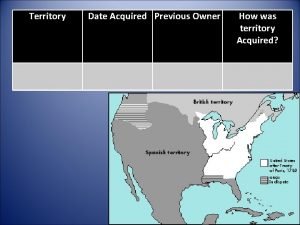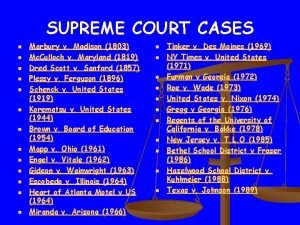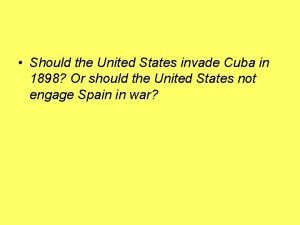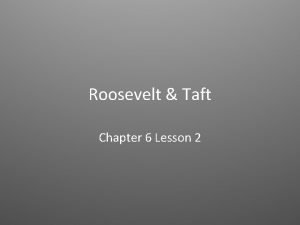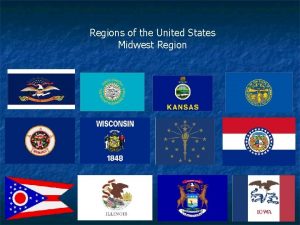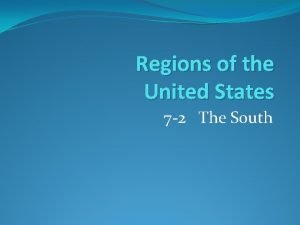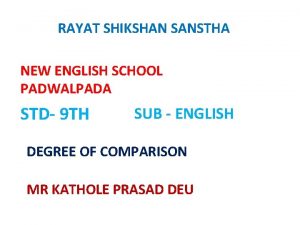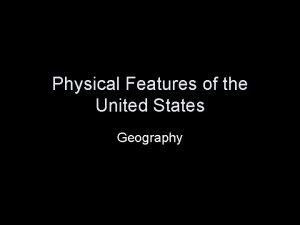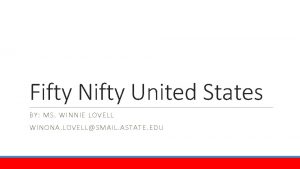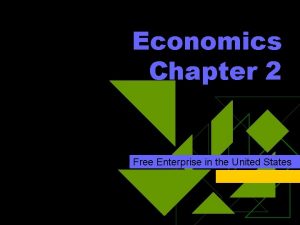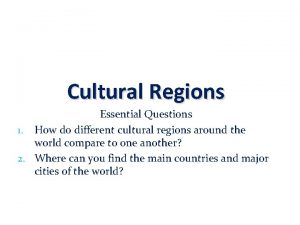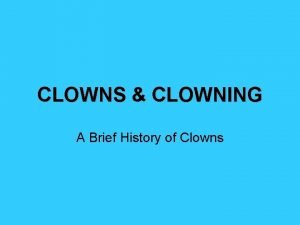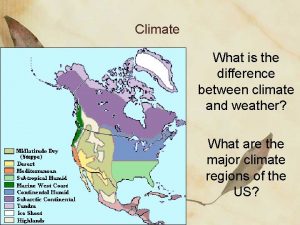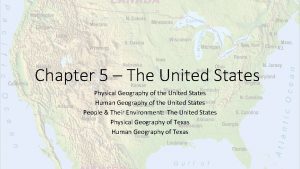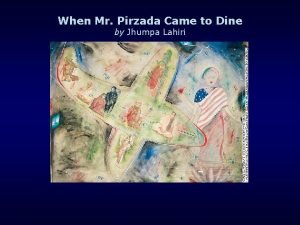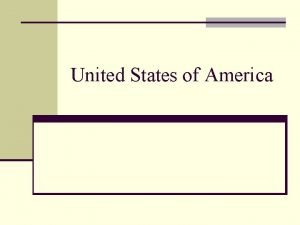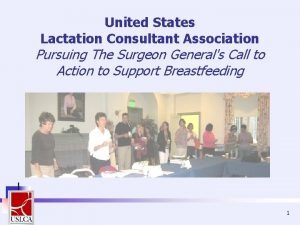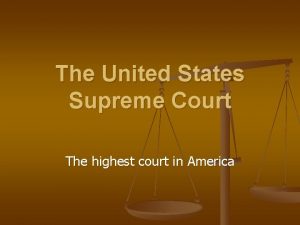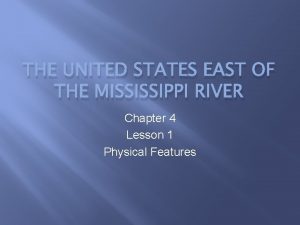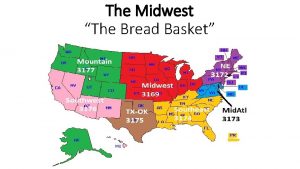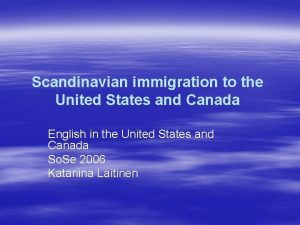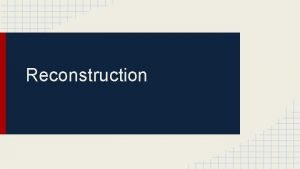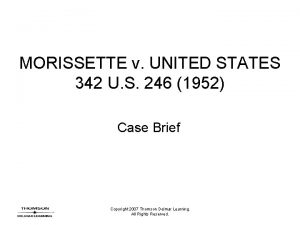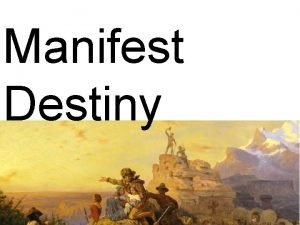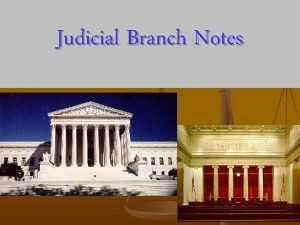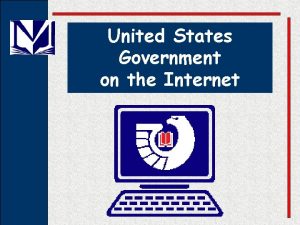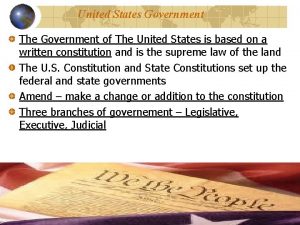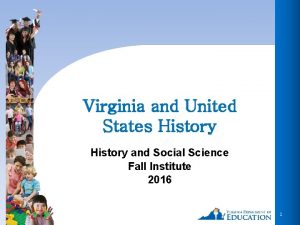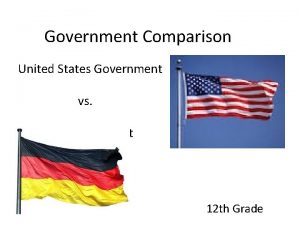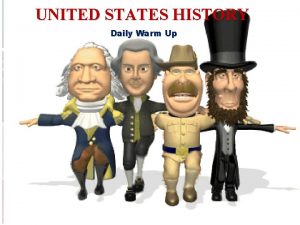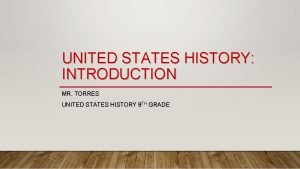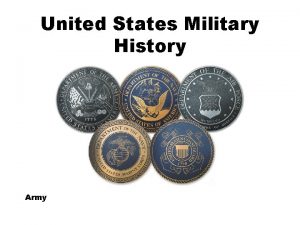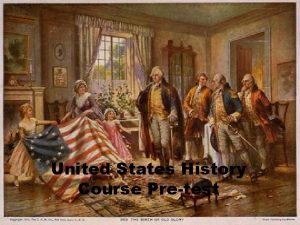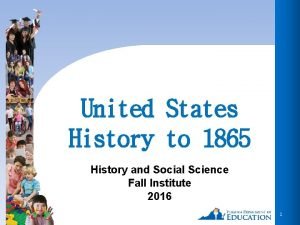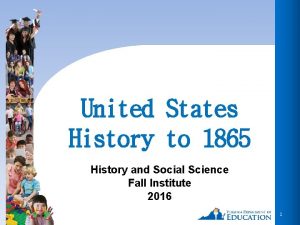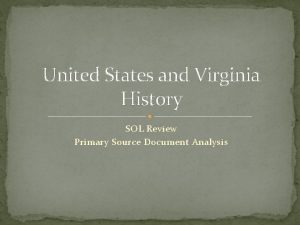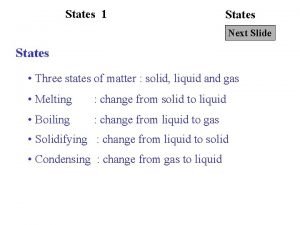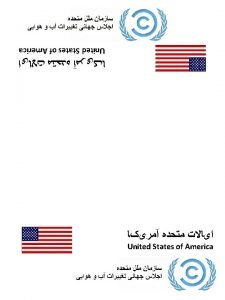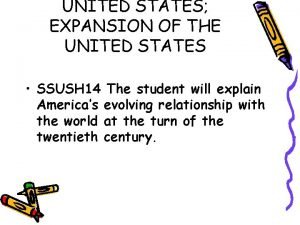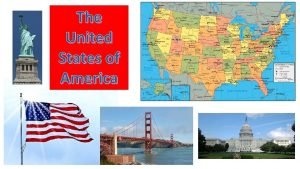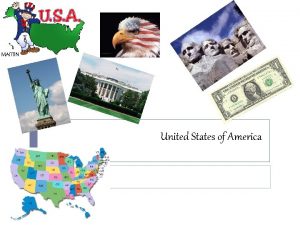Virginia and United States Government History and Social




























![Problem: __________ PACED Decision Grid: [Problem, Alternatives, Criteria, Evaluate, Decision] Criteria Alternatives 29 Problem: __________ PACED Decision Grid: [Problem, Alternatives, Criteria, Evaluate, Decision] Criteria Alternatives 29](https://slidetodoc.com/presentation_image_h/0efadc8a3a0ee1b673f98a7069102bca/image-29.jpg)


















- Slides: 47

Virginia and United States Government History and Social Science Fall Institute 2016

DISCLAIMER Reference within this presentation to any specific commercial or noncommercial product, process, or service by trade name, trademark, manufacturer or otherwise does not constitute or imply an endorsement, recommendation, or favoring by the Virginia Department of Education

Questions to Ask During Planning Essential Components in Planning an Effective Lesson using the 2015 History and Social Science Standards of Learning • What do students need to know and understand by the end of this lesson? • What do students need to do during this lesson? • Which historical thinking skills are best suited for this standard? • What other content material should be added to provide historical context and richness to the lesson in order to maximize student understanding of the standard? • What student learning experiences would be most effective during this lesson? • How can I check for understanding effectively and accurately to measure the students’ content knowledge and historical thinking skills? 3

It starts with the. . . 4

2015 SOL Skill Progression 5

2015 SOL Skill Progression 2008 Standards: Understand content 2015 Standards: Understand content by applying the skill. Skills are aligned with English Standards 6

7

Experiences for Essential Skills What are Experiences? 8

The experiences should be – • engaging, • rigorous with higher level thinking questions, • relevant (connecting time periods, places, and events to the present day).

Experiences Are. . . Are NOT. . . • Engaging- promoting discussion, collaboration, and understanding • Opportunities to practice social science skills using various content • Varied throughout the lesson to help students make connections • Worksheets • Specific to one Standard, topic, or course 10

11

Student Learning Experiences What is a “Student Experience”? What it means: • Students will be more engaged and active in the process • They will be able to create a “product” that will demonstrate their mastery of the historical content and concepts in a contemporary concept. bit. ly/CEGOVTskills 12

Start with the Content Standard. . . GOVT 6 f -. . . analyzing voter turnout in local, state, and national elections. 13

Then choose a skill standard… GOVT 1 b -. . . analyzing how political and economic trends influence public policy, using demographic information and other data sources 14

1 b Essential Understandings • Analysis includes identifying important trends based on demographic information and other data sources. • Demographic information is often used by governments and businesses in the development of policies and decisions. 15

1 b Essential Understandings • Demographic information is presented in a variety of forms, including the following: • Election data • Economic data • Census data 16

Voter Speed Dating 17

Let’s Try Another 18

• Skills – Gov. 1 a • The student will demonstrate skills for historical thinking, geographical analysis, economic decision making, and responsible citizenship by planning inquiries by synthesizing information from diverse primary and secondary sources; • EXPERIENCE: Determine commonalities and patterns in themes of the sources, as well as how the sources connect to the overarching topic of the lesson • Content – Gov. 2 b, c, d, e, f, 4 d 19

Context/teaching ideas • Focus #1 – Recall the Articles of Confederation and identify some of weaknesses and issues that emerged with the new nations first government. • Focus #2 - Primary Sources – explain the difference between and primary and secondary sources. • Focus #3 – How can we use primary sources to understand what the people of the time were thinking as it relates to major historical events? 20

The Lesson is a truly project based assignment. However, students will need to be shown how you want them to sort through the documents. 21

• Teacher • Place students in groups of 4 • Read the scenario AFTER the Focus question • Demonstrate how you want students to notate (my demonstration is how I would do it – again, please modify to fit your class) 22

Let’s Try Another 23

• Skill: GOVT. 1 h The student will demonstrate skills for historical thinking, geographical analysis, economic decision making, and responsible citizenship by using a decision-making model to analyze the costs and benefits of a specific choice, considering incentives and possible consequences; • Content: GOVT. 15 f The student will apply social science skills to understand the role of government in the Virginia and United States economies by evaluating the trade-offs in government decisions. 24

What does each of these words mean? • • Cost Benefit Incentives Opportunity Cost Use some sort of mobile technology to have teachers create their own definitions. 25

Definitions • Cost: what you give up when you decide to do something. • Benefit: what satisfies your wants • Incentives: Incentives are actions or rewards that encourage people to act. • Opportunity Cost: is what is given up when a choice is made, (the second best alternative). 26

Express Lanes 27

Should the 95 Express lanes be extended to Fredericksburg? Benefits of Extending the Express Lanes Costs of Extending the Express Lanes 28
![Problem PACED Decision Grid Problem Alternatives Criteria Evaluate Decision Criteria Alternatives 29 Problem: __________ PACED Decision Grid: [Problem, Alternatives, Criteria, Evaluate, Decision] Criteria Alternatives 29](https://slidetodoc.com/presentation_image_h/0efadc8a3a0ee1b673f98a7069102bca/image-29.jpg)
Problem: __________ PACED Decision Grid: [Problem, Alternatives, Criteria, Evaluate, Decision] Criteria Alternatives 29

Problem: How could $500 million be spent? PACED Decision Grid: [Problem, Alternatives, Criteria, Evaluate, Decision] Criteria Alternatives Direct impact on self Improve Virginia Economy Extend Express Lanes Improve Public Transportation Enhance Higher Education funding Increase Social Programs (expand Medicaid) 30

Problem: How could $500 million be spent? PACED Decision Grid: [Problem, Alternatives, Criteria, Evaluate, Decision] Criteria Alternatives Direct impact on self Improve Virginia Economy Extend Express Lanes Improve Public Transportation Enhance Higher Education funding Increase Social Programs (expand Medicaid) If you have a tie – add a multiplier to the criteria that is MOST important to you! 31

Historical Decision: Building the Interstate Highway System BEFORE CHOICE WAS MADE – “Assumed” Cost-Benefit Analysis Costs (things given up) Benefits (positive things gained) CHOICE OUTCOME – Actual Intended vs. Unintended Consequences INTENDED Consequences (thought would happen and actually did) UNINTENDED Consequences (did not know would happen) 32

Another Example 33

Content Standards GOVT 6 c -. . . analyzing the influence of media coverage, campaign advertising, public opinion polls, social media, and digital communications on elections 34

Detecting Bias Sort the Source! 35

Which skill did we practice? GOVT 1 d -. . . evaluating critically the quality, accuracy, and validity of information to determine misconceptions, fact and opinion, and bias 36

Content Standards GOVT 6 f -. . . analyzing voter turnout in local, state, and national elections. 37

Source: https: //www. washingtonpost. com/news/thefix/wp/2015/05/11/rip-american-idol-the-show-that-gave -us-an-easy-shorthand-for-americans-not-voting/ 38

Cost/Benefit Analysis: Should I vote in this year’s presidential election? Costs Benefits 39

PACED Decision-Making Grid: What should our country do to increase voter turnout? 40

Which skill did we practice? GOVT 1 h -. . . using a decision-making model to analyze the costs and benefits of a specific choice, considering incentives and possible consequences 41

Writing to Learn ● Not graded ● Prior to lesson ● Assess student background knowledge ● End of lesson ● Check understanding ● Make Connections ● Answer BIG QUESTION ● Free-write

Resources Library of Congress National Archives (Docs. Teach) Virginia Council for Economic Education Virginia Geographic Alliance Political Advertisements 43

Reflections: • 3 things you learned, • 2 ways you can use this learning in your class, and • 1 question you still have 44

Questions? 45

Nakita Lee Chesterfield County nakita_lee@ccpsnet. net Jessica Mitchell Newport News Jessica 48. Mitchell@nn. k 12. va. us David Wessel Spotsylvania County dwessel@spotsylvania. k 12. va. us Michelle Cottrell. Williams Arlington Michelle. cottrell@apsva. us Tim Duncan Wise County tduncan@wisek 12. org Courtney Kelly Cumberland County ckelly@cucps. k 12. va. us 46

Virginia Department of Education Christonya Brown, K-12, History and Social Science Coordinator E-mail: Christonya. Brown@doe. virginia. gov Betsy Barton, Elementary, History and Social Science Specialist Email: Betsy. Barton@doe. virginia. gov Jill Nogueras, English & History and Social Science Specialist Email: Jill. Nogueras@doe. virginia. gov 47
 Us history regents essay
Us history regents essay United states government principles in practice
United states government principles in practice Consequences of social class
Consequences of social class Awake united states
Awake united states United states and canada physical map
United states and canada physical map Earth map latitude
Earth map latitude Settlement patterns
Settlement patterns Does canada have mountains
Does canada have mountains Unit 2 the united states and canada worksheet answers
Unit 2 the united states and canada worksheet answers United states acquisitions and annexations 1857-1904
United states acquisitions and annexations 1857-1904 Seo northern virginia virginia
Seo northern virginia virginia Was the united states on the axis powers or allied powers?
Was the united states on the axis powers or allied powers? Sectionalism map of the united states
Sectionalism map of the united states Pro soccer us
Pro soccer us Marshall case
Marshall case United states student association
United states student association The united states ought to provide a universal basic income
The united states ought to provide a universal basic income Article i of the constitution
Article i of the constitution The united states in the caribbean 1776-1985
The united states in the caribbean 1776-1985 Products of the southeast
Products of the southeast Expansion of the united states of america 1607 to 1853 map
Expansion of the united states of america 1607 to 1853 map How does nicholas novikov describe the united states
How does nicholas novikov describe the united states Original 13 states date acquired
Original 13 states date acquired Mapp v. ohio
Mapp v. ohio We have pacified some thousands of the islanders
We have pacified some thousands of the islanders Chapter 6 lesson 2 roosevelt and taft
Chapter 6 lesson 2 roosevelt and taft Midwest region of the united states
Midwest region of the united states 7 regions of the united states
7 regions of the united states The united states is the greatest buyer positive degree
The united states is the greatest buyer positive degree Major physical features of united states
Major physical features of united states North south east west in our calm objective opinion
North south east west in our calm objective opinion Chapter 2 free enterprise in the united states answer key
Chapter 2 free enterprise in the united states answer key North central america
North central america Yu sze jester
Yu sze jester Subtropical united states
Subtropical united states Physical geography of the united states
Physical geography of the united states Ibn-tamas v. united states
Ibn-tamas v. united states When mr pirzada came to dine theme
When mr pirzada came to dine theme What is the geographical position of the united states
What is the geographical position of the united states United states lactation consultant association
United states lactation consultant association What is the highest court in the united states? *
What is the highest court in the united states? * Mississippi physical features
Mississippi physical features Bread basket near me
Bread basket near me How many states canada
How many states canada United states v. cruikshank apush
United states v. cruikshank apush Morissette v. us
Morissette v. us Us land acquisition map
Us land acquisition map Schenck vs united states ruling
Schenck vs united states ruling
